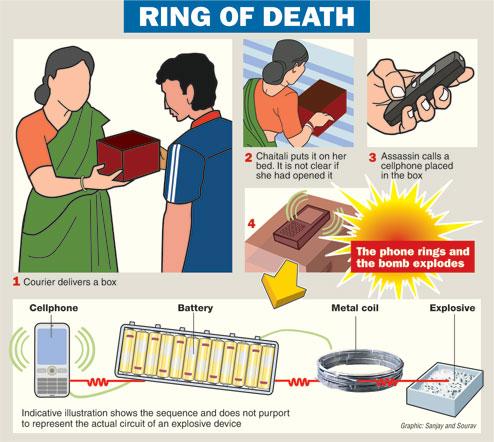 |
A polytechnic engineer arrested for domestic violence allegedly hired for Rs 2 lakh a man he had met in jail to kill the rights activist who had encouraged his wife to go to police.
This startling revelation by investigators in the Howrah parcel bomb case comes eight days after freelance crime reporter and rights activist Chaitali Santra accepted a packet delivered at her doorstep, little knowing that an improvised explosive device inside it would kill her and leave husband Himangshu critically injured.
The police say Debasish Dey, 36, not only paid co-accused Shubhankar Das to execute his plan but also drew for him the circuit of the explosive device that killed Chaitali.
“The device was cased in a tin container and detonated through a cellphone that rang the moment the victim opened the parcel, activating the circuit,” an investigator said.
Debasish, an assistant manager with a multinational company engaged in the JSW Energy project in Maharashtra, was arrested there on Wednesday night. A police team from Howrah is bringing him back from Jaigad in Ratnagiri district, around 300km from Mumbai.
The midnight raid on Dey’s official quarters followed the arrest of Shubhankar and his two alleged accomplices in Howrah earlier on Wednesday.
Biswajit Majhi, an employee in Shubhankar’s iron fabrication unit, allegedly procured the raw material for the explosive device and helped assemble it. A third person, identified as Abhishek Roy, masqueraded as a courier company employee and delivered the parcel bomb at Chaitali’s house at 47/2 Dakshin Baksara, Lalkuthi.
The police said Shubhankar had accompanied Abhishek to Chaitali’s home on a motorbike. Investigators have yet to find out who dialled the number of the cellphone that activated the circuit.
All three co-accused are from Liluah and in their mid-20s. Debasish had met Shubhankar during his 26-day incarceration last year, based on estranged wife Madhurima’s complaint about mental and physical torture at the hands of her husband and in-laws. Shubhankar too had been booked under Section 498A of the IPC for allegedly torturing his wife.
“There was no motive (to kill) other than a personal grudge,” Howrah commissioner of police Ajey Ranade said.
Chaitali’s daughter Shatabdi had named Debasish as a suspect, saying he had threatened to get even with her mother in a call to his father-in-law.
“My mother never interfered in anyone’s business. She would help only if she received a written request. In this case, (Dey’s wife) Madhurima had requested her intervention in writing,” Shatabdi, a college student, told Metro.
The Santra and Dey families are a few houses apart at Dakshin Baksara in Howrah’s Shibpur neighbourhood. The Dey residence has, however, been locked for months. A tenant lives on the ground floor.
Explosives experts said the parcel bomb that killed Chaitali was once a favourite with militants. Cellphone-activated bombs have been used to trigger terror attacks in Madrid and London.
“They are not as widely used now because the use of a phone makes tracking the culprits easier,” the expert said.
Apart from the cellphone that activated the bomb circuit, the tin container inside the wooden box hand-delivered to Chaitali contained explosives identified by forensics as a mixture of ammonium nitrate and potassium. A dozen batteries and a metal coil were also found.
“The moment the phone rang, the cellphone ringer passed on the energy to the batteries. The batteries heated the metal coil. The coil, in contact with the explosives, triggered the blast,” an officer said.
In Bengal, the only other instance of a parcel bomb killing someone was in Malda last year, when explosives were stuffed into the cavity of a book and a pressure-release mechanism used to trigger the blast. The victim was a lady schoolteacher.
All four accused in the Howrah case have been charged with murder and criminal conspiracy and under the Explosives Act.
The additional superintendent of police in Ratnagiri, Nandkumar Thakur, told Metro that Debasish made no attempt to evade arrest when the cops knocked on his door.
“He was composed,” he said.











